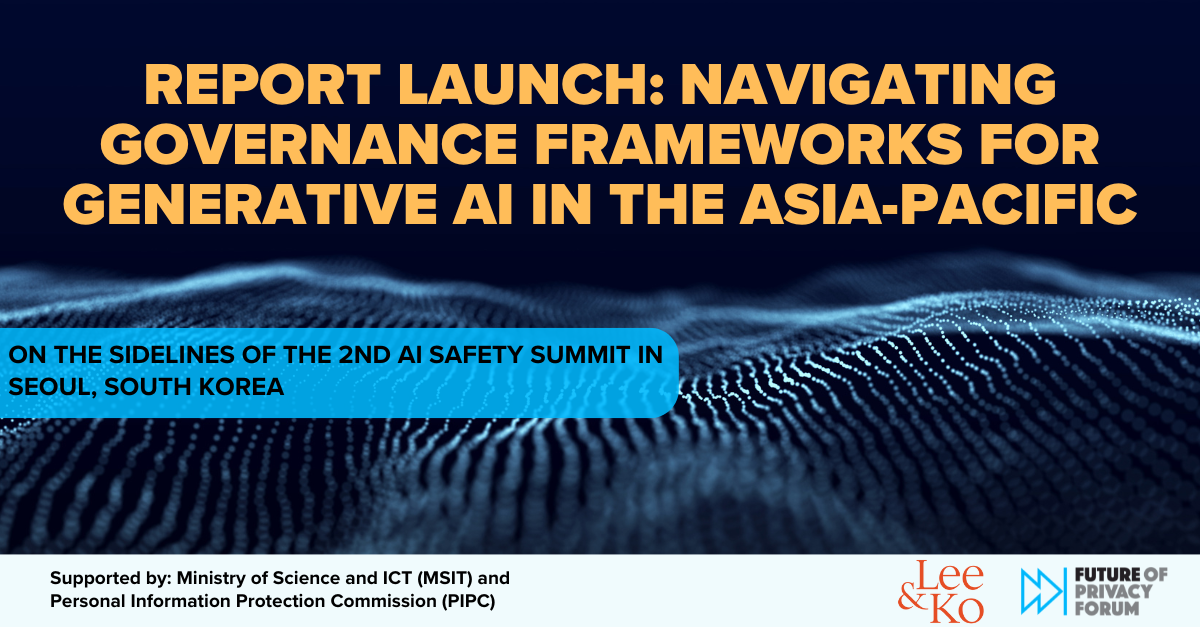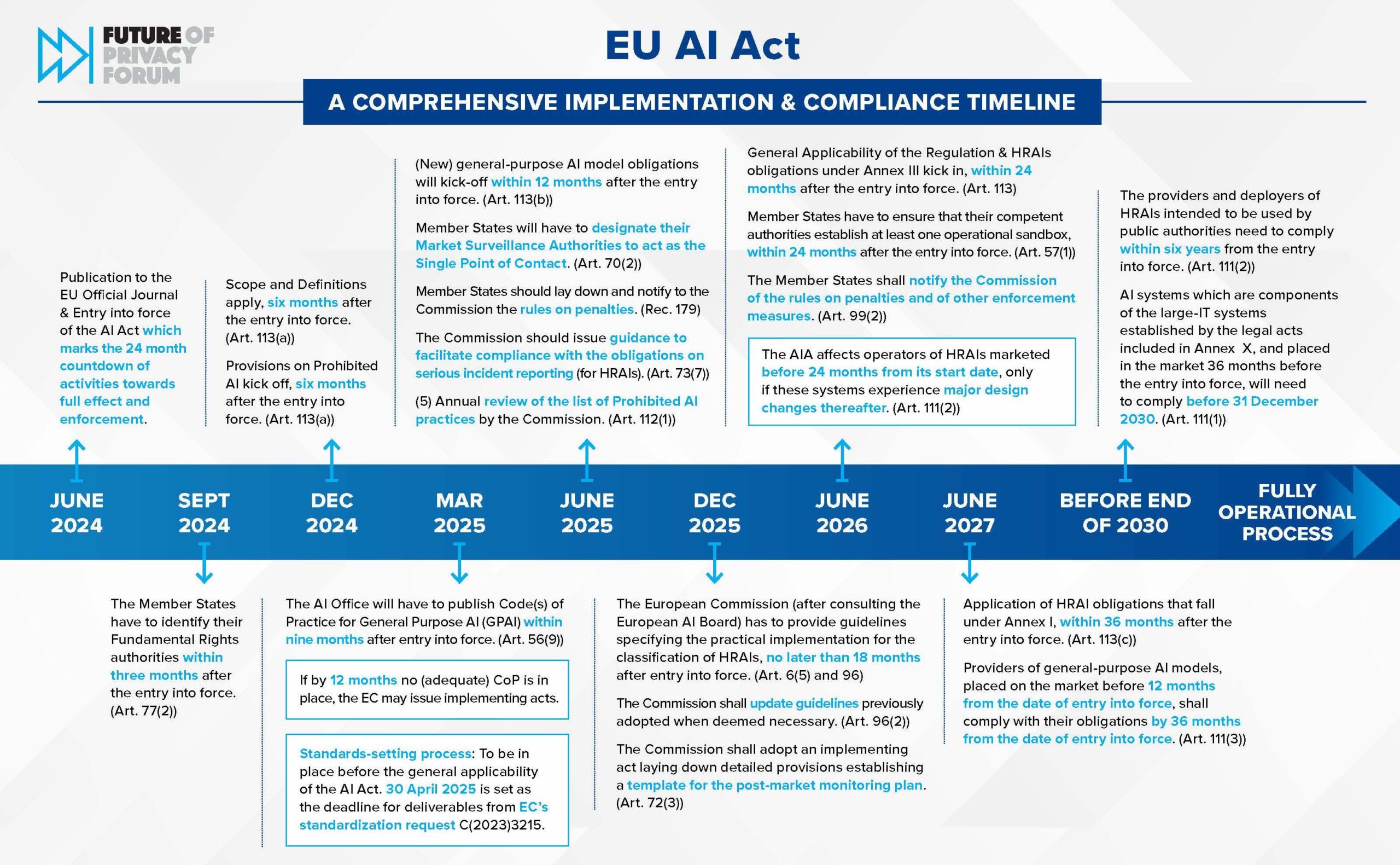
FPF Submits Comments to the Office of Management and Budget on AI and Privacy Impact Assessments
On April 1, 2024, the Future of Privacy Forum filed comments to the Office of Management and Budget (OMB) in response to the agency’s Request for Information on how privacy impact assessments (PIAs) may mitigate privacy risks exacerbated by AI and other advances in technology. The OMB issued the RFI pursuant to the White House’s […]

REPORT LAUNCH: NAVIGATING GOVERNANCE FRAMEWORKS FOR GENERATIVE AI IN THE ASIA-PACIFIC
The Future of Privacy Forum (FPF) has been globally and deeply engaged in AI governance and regulation for nearly a decade. Since 2023, FPF’s Asia-Pacific office (FPF APAC) has been engaged in a year-long study on the governance and regulation of “Generative AI Systems” in the Asia-Pacific. At the same time, Lee & Ko, a […]

Global Privacy Intern
The Future of Privacy Forum (FPF) is a non-profit organization that serves as a catalyst for privacy leadership and scholarship, advancing principled data practices in support of emerging technologies. FPF brings together industry, academics, consumer advocates, and other thought leaders to explore the challenges posed by technological innovation and develop privacy protections, ethical norms and workable business […]

FPF Statement on the adoption of the EU AI Act and New Resource Webpage
“Today the European Union adopted the EU AI Act at the end of a long and intense legislative process. At the Future of Privacy Forum we believe that multistakeholder global approaches and advancing common understanding in the area of AI governance are key to ensuring a future with safe and trustworthy AI, one that protects […]

Event Recap: FPF X nasscom Webinar Series – Breaking Down Consent Requirements under India’s DPDPA
Following the enactment of India’s Digital Personal Data Protection Act 2023 (DPDPA), the Future of Privacy Forum (FPF) and nasscom (National Association of Software and Service Companies), India’s largest industry association for the information technology sector, co-hosted a 2-part webinar series focused on the consent-centric regime under the DPDP Act. Spread across two days (November […]

The DNA of Genetic Privacy Legislation: Montana, Tennessee, Texas, and Virginia Enter 2024 with New Genetic Privacy Laws Incorporating FPF’s Best Practices
In 2023, four states enacted new genetic privacy laws regulating direct-to-consumer genetic testing companies. This blog post provides details on what these new laws cover and how they compare to FPF’s widely-adopted Best Practices for Consumer Genetic Testing Services. Genetic privacy has been under increasing scrutiny at the state and federal levels, and regulators are […]

FPF Awarded NSF and DOE Grants to Advance White House Executive Order on Artificial Intelligence
The Future of Privacy Forum (FPF) has been awarded grants by the National Science Foundation (NSF) and the Department of Energy (DOE) to support FPF’s establishment of a Research Coordination Network (RCN) for Privacy-Preserving Data and Analytics. FPF’s work will support the development and deployment of Privacy Enhancing Technologies (PETs) for socially beneficial data sharing […]

RECs Report: Towards a Continental Approach to Data Protection in Africa
On July 28, 2022, the African Union (AU) released its long-awaited African Union Data Policy Framework (DPF), which strives to advance the use of data for development and innovation, while safeguarding the interests of African countries. The DPF’s vision is to unlock the potential of data for the benefit of Africans, to “improve people’s lives, […]

The Garden State Joins the Comprehensive Privacy Grove
On January 16, 2024, Governor Murphy signed S332 into law, making New Jersey the thirteenth U.S. State to adopt a comprehensive privacy law to govern the collection, use, and transfer of personal data. S332 endured a long and circuitous route to enactment, having been introduced in January 2022 and amended six times before being passed […]

Understanding Body-Related Data Practices and Ensuring Legal Compliance in Immersive Technologies
Organizations are increasingly incorporating immersive technologies like extended reality (XR) and virtual worlds into their products and services, blurring the boundaries between the physical and digital worlds. Immersive technologies hold the potential to transform the way people learn, work, play, travel, and take care of their health, but may create new privacy risks as well. […]
